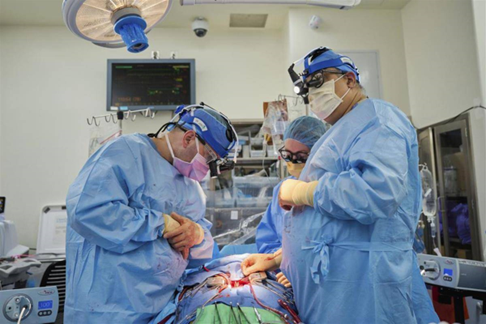There are two more pigs who are transplanted into human body. The "two brothers" bring a new dawn?
Author:Medical newspaper Time:2022.07.14
Today the Morning Post reported the news of pig heart transplantation. In the background, there were friends who asked Xiaobian where could I see detailed reports. No, Xiaobian was arranged!
Doctors at the University of New York University of Landney Transplantation announced that two gene edited pig hearts were transplanted into two patients with brain death. One of the transplants was performed in mid -June and the other was completed on July 9.

Surgery site
(Source: New York University Landney Transplant Research Institute)
After two transplants, the function of the transplantation heart was monitored for 3 days. Neither heart was observed in the early rejection reactions. When the drug treatment was treated only after only conventional transplantation and no additional mechanical support, the heart could be maintained. normal work.
Another research team of the medical center successfully transplanted pig kidneys to patients with brain death in October 2020. After transplantation, pig kidneys worked normally for 54 hours without rejection.
In March of this year, the world's first patient to be transplanted with pig heart transplants and 57 -year -old Beline died two months after surgery.
This time, the pig heart used by the New York University team came from the same gene editing pig suppliers as before, but the researchers used more stringent virus screening methods and did not detect pig giant cell virus in the heart heart. Researchers believe that pig heart transplantation can provide more data on patients with brain death, but at present, experiments can only evaluate the transplant organs and remains after transplantation, limiting their data mobile phones.
But there may be a long way to go to the reliable choice of human heart transplantation from a pig heart.
Alien organs transplant a century ago
Compared with the transplantation of the same type of alien organ, the study of heterogeneous transplantation starts earlier, and its history can be traced back to a century ago.
Transplantation donors from sheep, crickets to chimpanzees and other primates. The transplanted organs research include kidney, liver, heart, and even testicles and teeth. From solving organ failure to improving organ functions, research methods can be described as endless. However, due to technical restrictions and poor transplantation effects, they ended in failure, which also caused the research progress of heterogeneous transplants very slowly, and even was once banned.
The failure of four exotic transplant cases from the 1980s to the 1990s occurred, which even caused the clinical application of heterogeneous organs to be directly banned.
In 1984, in Los Angeles in the United States, the doctor gave a heart transplant for a premature child and baby.
In June 1992, in Pittsburgh, the United States, there were doctors who transplanted with liver pheasant, one of which died of a composite infection 70 days after surgery, and the other 1 died 26 days after surgery to the biliary complications peritonitis.
In October 1992, in the United States, because he could not wait for the same liver, doctors performed pork liver transplants for patients with upset liver coma. The patient died 24 hours after transplantation was completed.
The above 4 consecutive cases of heterogeneous transplantation failure have made the research on clinical application of heterogeneous transplantation experience a long freezing era, and this "freezing" is 30 years.

8.19 Chinese Physician's Day Special offer "Healthy China, You and Me-Caring for Life 'Salvation" around you "Multi-City Metro Linkly Public Welfare Tour Exhibition
The dawn brought by "two brothers"
In recent years, with the in -depth development of immunogenic biology and genetic engineering research, the study of heterogeneous organ transplantation has made great progress.
"Early heterogeneous transplanted donors were mainly human apes." Doctors of the Ronggi Transplant Research Institute said that although the differences between immunology and physiology are large from humans, pigs Animals have relatively few obstacles to ethics, can be produced on a large scale, and have the advantages of similar similarity to human organs and easy transformation of genes. They have gradually become the most ideal donor of currently heterogeneous organ transplantation. By generating the genetic modification of the donor, the heterogeneous transplantation has made a new breakthrough in overcoming the super -acute rejection reaction and cross -object infection. These achievements have spawned a series of "alien transplant sub -clinical research models".
On December 14, 2020, the US Food and Drug Administration officially approved a genetically modified pig without α-galactose. It is a milestone to approve the consumption and medical dual use of genetic animals for the first time.
On October 20, 2021, the world's first pig kidney transplantation surgery was completed at the Lange Medical Center of New York University Medical College. This is the first heterogeneous transplantation study in the human body since the clinical study of heterogeneous transplantation. "This is a major event that can change the world." Said Professor Yang Sumin of the Heart Center of Affiliated Hospital of Qingdao University, this is a transformative historical event in the world medicine. We can boldly imagine that if the exotic transplantation is successful, and the technology is becoming more and more mature, the large organs of the human body, such as the heart, liver, spleen, kidney, and lungs can be transplanted. The length and quality are inestimable.
Subsequently, two groups of doctors transplanted gene edited pig kidneys into brain death remains in the United States to study the function and immune response of pig kidneys into the human body and immune response. The clinical experiments of these heterogeneous organs transplanted sub -clinical experiments provided a scientific basis for promoting heterogeneous transplantation into the real human clinical observation.
On January 7, 2022, a surgeon at the University of Maryland Medical Center performed a genetic modification pig heart transplant surgery for patients with advanced heart disease. This is the first surgery in the world to transplant the source of pig sources into human receptors. The pig used during the operation was transformed, and the three genes that "knocked out" caused rejection of people to rejection, and a gene to prevent excessive growth of pig heart tissue. After pig heart transplantation, normal heartbeat, pulse, and blood pressure detected in Benet body, and there was no obvious exclusive reaction. In the first five weeks after transplantation, the heart beating normally, and there were no signs of exclusion of heterogeneous organs. However, about 7 weeks after transplantation, the patient's condition began to deteriorate and eventually died. Researchers say that there is an irreversible damage in the heterogeneous migrant. As for the cause of the worsening condition, it may be related to the pig giant cell virus in the patient's body.
This clinical experiment brought hope to hundreds of thousands of patients suffering from organs.
China has been working hard
There are about 300,000 patients who need to be transplanted due to final organ failure each year, but only more than 10,000 people have the opportunity to obtain organ transplantation, and the supply and demand ratio is 1: 30.
How to balance the supply and demand relationship of organ transplants? Heterogeneous transplantation provides a new solution. According to reports, many domestic teams are currently engaged in related research on heterogeneous organs.
In March of this year, my country's heterogeneous organ transplantation supply of production and research base projects began construction in Neijiang, Sichuan. According to the plan, the medical pig DPF (super clean) facilities will be constructed, including a closed quarantine house and a series of sterile -level surgery, breeding houses, etc., to provide biological safety donors for clinical trials of alien organ transplants.
In April, under the guidance of the National Committee of Health and Health, the China Organ Transplant Development Foundation released the "Consensus on the Association of Clinical Test Experts in Chinese Human Alien Words and Global Transplantation". The consensus pointed out that for the transplantation of heterogeneous organs, it should be based on the attitude of "encouraging research and prudent development" to scientifically evaluate research and progress and sober cognitive risks.
"The biggest problem is heterogeneous, and gene difference is the biggest problem." Professor Weng Guoxing, chest, cardiovascular vascular surgery of Fujian Provincial Hospital, said that after genetic editing, pig hearts are used for human transplantation and are one of the direction of organ transplantation. The size of the heart is closest to humans, but the genes of transforming pigs make it closer to humans and have a lot of work to do!
Capture: Liu Zibo
Edit: Liu Zibo
- END -
The Ministry of Natural Resources is listed to supervise the problem of illegal land use in the Elephant Elephant River Valley Scenic Area in Henan
China Economic Net, Beijing, June 22. According to the website of the Ministry of Natural Resources, recently, the Ministry of Natural Resources has decided to supervise the problem of illegal land us
"I grew up with the hot soil of Qianhai, Shenzhen"

The Central Radio and Television Ceremony celebrates the theme song of Hong Kong's...